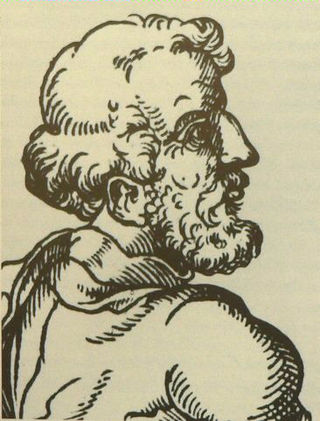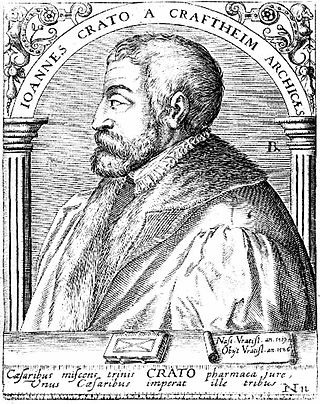
Conrad Celtes was a German Renaissance humanist scholar and poet of the German Renaissance born in Franconia. He led the theatrical performances at the Viennese court and reformed the syllabi.
The 1711 Sales Auction Catalogue of the Library of Sir Thomas Browne highlights the erudition of the physician, philosopher and encyclopedist, Sir Thomas Browne (1605-1682). It also illustrates the proliferation, distribution and availability of books printed throughout 17th century Europe which were purchased by the intelligentsia, aristocracy, priestly, physician or educated merchant-class.

Johann Cochlaeus (Cochläus) was a German humanist, music theorist, and controversialist.

Ulrich von Hutten was a German knight, scholar, poet and satirist, who later became a follower of Martin Luther and a Protestant reformer.

Johann Georg Faust, also known in English as John Faustus, was a German itinerant alchemist, astrologer, and magician of the German Renaissance.

Rudolph Goclenius the Younger was a German physician and professor at Philipps University of Marburg.

Johannes Pfefferkorn was a German Catholic theologian and writer who converted from Judaism. Pfefferkorn actively preached against the Jews and attempted to destroy copies of the Talmud, and engaged in a long running pamphleteering battle with humanist Johann Reuchlin.

John Jonston or Johnston was a Polish scholar and physician, descended from Scottish nobility and closely associated with the Polish magnate Leszczyński family. The standard author abbreviation Jonst. is used to indicate this person as the author when citing a botanical name.
Veit Amerbach, was a German Lutheran theologian, scholar and humanist, who converted to Catholicism.

Valentin Weigel was a German theologian, philosopher and mystical writer, from Saxony, and an important precursor of later theosophy. In English he is often called Valentine Weigel.

Joachim Westphal was a German "Gnesio-Lutheran" theologian and Protestant reformer.

Jacob Micyllus, was a German Renaissance humanist and teacher, who conducted the city's Latin school in Frankfurt and held a chair at the University of Heidelberg, during times of great cultural stress in Germany.

Theatrum Chemicum is a compendium of early alchemical writings published in six volumes over the course of six decades. The first three volumes were published in 1602, while the final sixth volume was published in its entirety in 1661. Theatrum Chemicum remains the most comprehensive collective work on the subject of alchemy ever published in the Western world.
Christian Frederick Matthaei, a Thuringian, palaeographer, classical philologist, professor first at Wittenberg and then at Moscow.
Franz Anton Knittel was a German, Lutheran orthodox theologian, priest, and palaeographer. He examined palimpsests' text of the Codex Guelferbytanus 64 Weissenburgensis and deciphered text of Codex Carolinus. He was the author of many works.

Johannes Crato von Krafftheim was a German humanist and court physician to three Holy Roman emperors.
Jakob Monau, also known as Jacobus Monavius or Iacobus Monaw, was a polymath and leader of the Reformed Protestant faction after Johannes Crato von Krafftheim's death.
Valentin Krautwald (1465–1545) was a German religious reformer, lector of theology at Liegnitz, and colleague of Caspar Schwenckfeld.
The Deutsche Theatrum Chemicum is a collection of alchemical texts, predominantly in German translation, which was published in Nuremberg in three volumes by Friedrich Roth-Scholtz (1687–1736), the publisher, printer and bibliographer.
Berthold Rembolt was a medieval printer.












